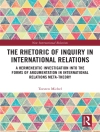Bound up with the human cost of HIV/AIDS is the critical issue of its impact on national and international security, yet attempts to assess the pandemic’s complex risk fail to recognize the political dangers of construing the disease as a security threat. The securitization of HIV/AIDS not only affects the discussion of the disease in international policy debates, but also transforms the very nature and function of security within global politics.
In his analysis of the security implications of HIV/AIDS, Stefan Elbe addresses three concerns: the empirical evidence that justifies framing HIV/AIDS as a security issue, the meaning of the term ’security‘ when used in relation to the disease, and the political consequences of responding to the AIDS pandemic in the language of security. His book exposes the dangers that accompany efforts to manage the global spread of HIV/AIDS through the policy frameworks of national security, human security, and risk management. Beyond developing strategies for mitigating these dangers, Elbe’s research reveals that, in construing the AIDS pandemic as a threat, policymakers and international institutions also implicitly seek to integrate current security practices within a particular rationalization of political rule. Elbe identifies this transformation as the ‚governmentalization‘ of security and, by drawing on the recently translated work of Michel Foucault, develops a framework for analyzing its key elements and consequences.
Inhaltsverzeichnis
Acknowledgments
1. Viruses, Health, and International Security
2. A Noble Lie? Examining the Evidence on AIDS and Security
3. Security in the Era of Governmentality: AIDS and the Rise of Health Security
4. National Security: Sovereignty, Medicine, and the Securitization of Aids
5. Human Security: Discipline, Healthy Bodies, and the Global Curing Machine
6. Risk and Security: Government, Military Risk Groups, and Population Triage
7. The Power of AIDS: Responding to the Governmentalization of Security
References
Index
Über den Autor
Stefan Elbe is reader (associate professor) in the Department of International Relations at the University of Sussex, where he teaches security studies. Previously, he held positions at the London School of Economics, the International Institute for Strategic Studies, the University of Essex, and the University of Warwick.












